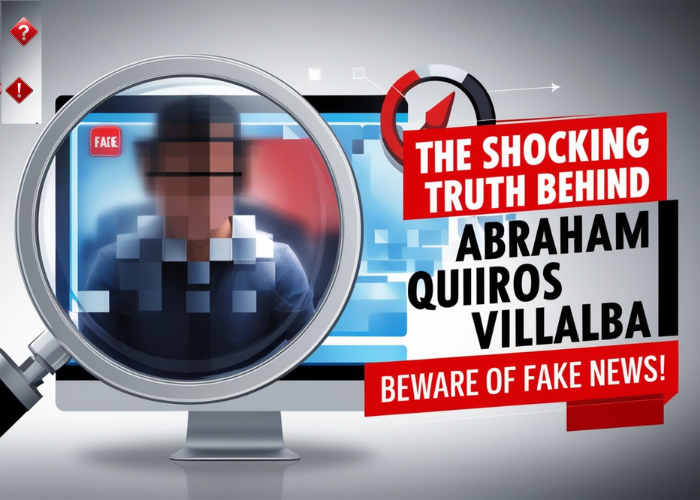In an age where information is just a click away, it’s becoming increasingly difficult to differentiate between what’s real and what’s fabricated. One name that has recently surfaced in many online blogs and articles is Abraham Quiros Villalba. But who is he really? And why is there so much confusion and misinformation surrounding him?
In this article, we will uncover the truth about Abraham Quiros Villalba, the dangers of fake news, and the growing issue of online scams. We will also discuss how many websites and content creators use AI-generated articles just to attract clicks without verifying the accuracy of the details they publish. You’ll learn how to protect yourself from falling into these traps and what to look for when navigating the web for reliable information.
The Mystery of Abraham Quiros Villalba
Abraham Quiros Villalba is a name that has been popping up across multiple online platforms, including forums like Rupp Rafters, with many blogs and articles claiming to reveal shocking information about him. However, when you dig deeper, it becomes clear that much of the content surrounding him is unreliable, poorly researched, or even completely fabricated.
The Rise of Fake Content and Clickbait
One of the most common tactics used by certain websites is clickbait. Clickbait refers to sensational headlines designed to lure people into clicking on an article or webpage. These headlines are often misleading and promise shocking revelations or scandalous details, but the content rarely lives up to the hype.
For example, a typical headline about Abraham Quiros Villalba might say: “The Shocking Truth About Abraham Quiros Villalba That You Won’t Believe!” But when you click through, you find that the article either doesn’t provide any real information or is filled with vague, unverified claims. This type of content is specifically designed to attract traffic and generate revenue through ads, rather than informing the reader or offering valuable insights.
Why is This Content So Widespread?
The reason this kind of content is so common is simple: it’s all about traffic generation. Websites that create low-quality content or use sensational headlines can drive massive amounts of traffic to their pages. In turn, they make money from advertising revenue, affiliate marketing, or selling products. In some cases, these sites even harvest user data for later use.
Unfortunately, this often comes at the expense of truth, accuracy, and reliability. Many of these articles are written with little regard for the actual facts, and they rarely cite credible sources. The primary goal is to get you to click on the link and stay on the page long enough to generate revenue. Whether the content is true or not doesn’t matter.
AI-Generated Articles: The New Frontier of Misinformation
Another concerning trend is the rise of AI-generated articles. With the development of advanced AI tools, it has become easier than ever for websites to generate large volumes of content quickly. While AI can be incredibly useful for certain tasks, its application in content creation is often problematic, especially when the content is designed to mislead or deceive readers.
How AI is Used to Create Fake Content
AI tools are often used by websites to fill in the blanks of generic, prewritten articles. These tools can scrape data from various sources and generate text that appears to be well-researched. However, the problem arises when AI lacks the ability to verify the information it’s providing.
For instance, an AI might write about Abraham Quiros Villalba without checking whether the facts are true or sourced from legitimate outlets. It could generate paragraphs about his supposed biography, career, or personal life, and yet, much of the information could be wrong or completely made up. This is because AI is only as good as the data it’s been trained on—and often, the training data contains inaccuracies or outdated information.
Moreover, AI-written content is sometimes designed to optimize for SEO, making it appear at the top of search engines, regardless of its quality or factual accuracy. This results in articles that rank high on Google but are riddled with errors or misleading claims. AI, for example, might fill in gaps with common industry terms or phrases that sound authoritative but are ultimately meaningless.
Screenshots of AI-generated Content: Proof of the Problem
To illustrate the problem, we have screenshots that show how AI is being used to generate articles with little regard for factual accuracy. These articles might have vague or generic information and often lack references to credible sources. When you compare these AI-generated articles with trustworthy, well-researched content, the difference is obvious. In many cases, AI-written content doesn’t even properly address the topic or give relevant information.
If you look closely, you can see the telltale signs of AI writing—awkward sentence structure, lack of depth, and a tone that lacks genuine insight or expertise. It’s clear that the primary aim of these articles is not to inform or educate readers, but simply to rank on search engines and generate ad revenue.
Our Commitment to Accuracy and Quality
While we use AI tools to help assist in writing articles, we want to make it clear that we do not rely solely on AI to create content. We use AI to support our writing process, but before publishing any article, we carefully review it, ensure all details are accurate, and verify information from trusted sources. Our goal is to provide valuable, reliable, and well-researched content that adds real value to our readers.
Odyssey Curious believe that AI is a powerful tool when used properly, but it cannot replace human judgment and expertise. We take the time to validate every detail of the content we publish to make sure that you, our readers, can trust what you read. Unlike many websites that use AI to generate content solely for SEO purposes or to increase traffic, we prioritize quality over quantity and accuracy over sensationalism.
This commitment to quality and truth is what sets us apart. We aim to be a reliable source of information you can trust, and we always put our readers’ interests first. Our content may not always be the quickest to publish, but it is thoroughly researched, carefully written, and fact-checked to ensure that you get the best possible insights.
The Dangers of Fake News and Misinformation
When it comes to misinformation, the consequences can be serious. Here are a few reasons why it’s crucial to be vigilant when consuming information online:
1. Financial Risks
As mentioned earlier, many fake articles are designed to drive traffic to scam websites. These sites might promote fraudulent products, misleading services, or fake investments. When readers trust the information they find online without questioning it, they may fall victim to scams that drain their money or steal their personal information.
2. Damaged Reputations
False information can also harm people’s reputations. Whether it’s a public figure or a private individual, spreading unverified claims or rumors can have long-lasting consequences. If the information surrounding Abraham Quiros Villalba, for instance, is false or manipulated, it could tarnish his reputation without any basis in reality.
3. Distorted Reality
Fake news doesn’t just affect individuals—it affects society at large. When false information spreads, it can shape people’s perceptions, lead to misunderstandings, and even contribute to larger societal problems. It can cause people to make decisions based on incorrect or incomplete data, from political choices to financial investments.
4. Privacy and Security Risks
Certain scam websites take advantage of fake articles to gather personal data from unsuspecting users. This can include email addresses, phone numbers, or even financial information. Phishing scams and identity theft are often the result of such practices.
How to Protect Yourself from Fake News and Scams
Now that we understand the dangers, here are some practical steps you can take to protect yourself from fake news, AI-generated content, and online scams.
1. Verify the Source
Always check the credibility of the website and the author. Is the article published on a well-known and trustworthy platform? Does the author have a reputation for providing reliable information? If the article lacks an author or doesn’t link to credible sources, it’s a red flag.
2. Cross-Reference Information
If you come across an article or claim that seems too good (or too shocking) to be true, cross-reference it with multiple trustworthy sources. If the story is real, it will be reported by multiple reputable outlets. If it only appears on one site, it might be fabricated.
3. Be Skeptical of Clickbait Headlines
Avoid clicking on sensationalized headlines that promise “shocking revelations” or “unbelievable secrets.” Often, these headlines are designed to get you to click on the article without providing any substantial information.
4. Use Fact-Checking Websites
Platforms like Snopes, FactCheck.org, and PolitiFact are great tools for verifying information. These sites are dedicated to debunking false claims and rumors, and they can be invaluable when you’re unsure about the truth of a particular article or story.
5. Report Fake Content
If you encounter misleading or fake content, report it. Whether it’s on social media or a website, reporting these articles helps reduce their visibility and prevents others from being misled.
6. Educate Yourself About AI-Generated Content
Be aware of the rise of AI-generated content. While AI can be helpful for many tasks, it should never be relied upon as a sole source of information. Always question AI-generated content, especially when it lacks citations or credible references.
Conclusion: Staying Safe in the Digital Age
In conclusion, while the internet provides vast knowledge, it also contains misleading content and fake news. It’s crucial to verify information, especially with the rise of AI-generated articles. At our platform, we prioritize accuracy and transparency, ensuring our content is thoroughly researched and trustworthy. By staying vigilant and questioning sensational claims, we can protect ourselves from misinformation and navigate the digital world with confidence.
People Also Ask About Abraham Quiros Villalba
1. Who is Abraham Quiros Villalba?
Abraham Quiros Villalba is a name that has appeared in several online articles, often surrounded by misleading or fabricated information. There is little verifiable data available about him, and many of the claims are likely to be misinformation.
2. Why is there so much fake news about Abraham Quiros Villalba?
Much of the content surrounding Abraham Quiros Villalba is generated by websites looking to drive traffic. Sensational headlines and unverified details are used to attract readers and increase advertising revenue, regardless of the accuracy of the information.
3. How can I tell if content about a person or topic is fake?
To spot fake content, verify the source, check for credible references, and cross-reference the information with trusted outlets. Be cautious of sensational headlines and unverified claims that lack proper citations.
4. Is it safe to trust AI-generated articles?
AI can help in creating content quickly, but it may lack the ability to verify facts or provide deep analysis. Always ensure AI-generated content is reviewed and fact-checked before publishing to maintain accuracy and reliability.
5. How can I protect myself from online scams and fake news?
To protect yourself, always verify the information you come across by consulting trusted sources, using fact-checking websites, and being cautious of sensational headlines. If something seems too shocking or unbelievable, it’s worth double-checking.
6. How do I know if a website is trustworthy?
Trustworthy websites usually provide clear author information, cite credible sources, and avoid sensationalism. Always be skeptical of websites that focus solely on traffic generation or rely heavily on ads without offering substantial, verified content.
7. Why do some websites use misleading or fake content?
Many websites use misleading content to attract visitors for financial gain, such as ad revenue or affiliate marketing. These sites prioritize generating traffic over providing reliable and accurate information.



